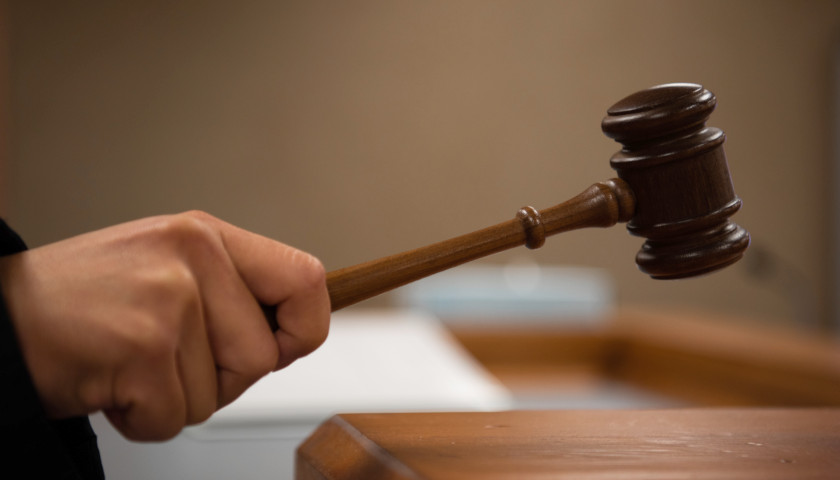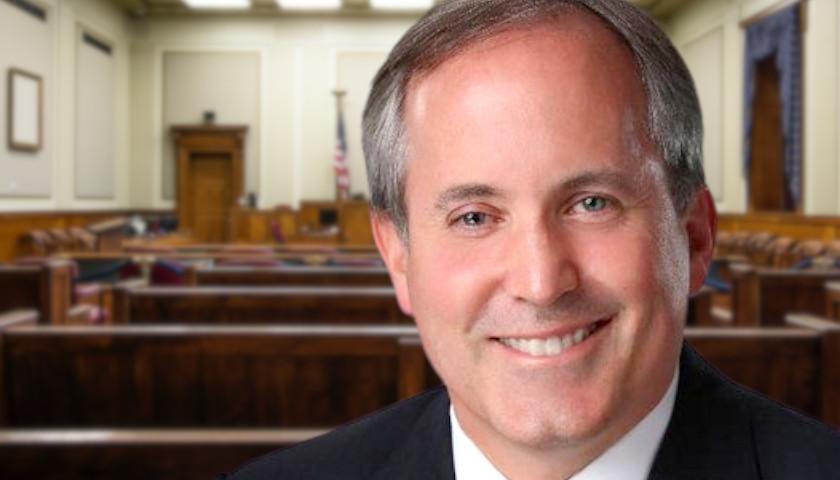A panel on the Arizona Court of Appeals ruled last week that Attorney General Kris Mayes’ prosecution of Cochise County Supervisor Tom Crosby for delaying canvassing of the 2022 election may proceed.
Crosby, along with Cochise County Supervisor Peggy Judd, was indicted for felonies by a grand jury in November 2023 for briefly delaying the canvassing of the 2022 election to investigate concerns with the voting machine tabulators. Judd accepted a plea agreement two months ago for a misdemeanor charge of failing to perform her duty as an election officer and was sentenced to probation.
State Senate President Warren Petersen (R-Mesa) and Speaker of the House Ben Toma (R-Peoria) filed an Amicus Curiae brief opposing the prosecution last March.
Crosby (pictured above) moved to dismiss the indictment due to legislative immunity. The trial court judge denied the motion, prompting him to file a Special Action with the appeals court in September, asking to dismiss the charges. In it, his attorney, Dennis Wilenchik, denounced the prosecution as “political.”
He said, “This matter is nothing more than the misguided political retribution of a partisan Attorney General abusing her powers,” and Crosby is being “wrongfully prosecuted as a political scapegoat. … The wrongful criminal prosecution of Arizona’s represented officials is at stake in this case as the Attorney General clearly seeks to stretch the boundaries of the criminal law beyond recognition for her own political ends.”
However, the appeals court agreed with the trial court, concluding his duty to certify the election results wasn’t discretionary so the prosecution could proceed.
Judge Paul McMurdie, considered one of the most progressive judges in Arizona, delivered the court’s opinion, joined by Judges Jennifer Campbell and Kent Cattani.
The situation arose immediately after the 2022 general election when Crosby and Judd voted to conduct a full hand count of all the precincts due to concerns about accuracy with the voting machine tabulators. In Pinal County, undervotes were found after the 2022 election on the voting machine tabulators for attorney general candidate Abe Hamadeh, decreasing Mayes’ lead over him to only 280 votes,
The Arizona Secretary of State’s (AZSOS) election director told Crosby and Judd that they did not have the authority for that but could only conduct a partial hand count.
However, then-Attorney General Mark Brnovich provided two written statements, one from November 4, 2020, and one from October 28, 2022, which stated that the supervisors had legal authority to conduct full hand counts.
When the deadline came for the county to certify the election, November 28, 2022, Crosby and Judd voted to postpone it until December 2, while the Democratic board member voted against it.
Then-Secretary of State Katie Hobbs brought a Special Action to force certification, and the court ordered the board to certify the results on December 2, 2024, which they did.
However, in Crosby’s Special Action, he pointed out, “[T]he Court’s decision was limited in scope, and could be straightforwardly interpreted as still permitting an expanded hand count as long as ballots from at least some precincts would not be counted, thereby preserving the ‘randomness’ requirement embedded in A.R.S. § 16-602(B).”
Mayes convinced a grand jury to indict Crosby on one count of Conspiracy, a class 5 felony, and one count of Interference with an Election Officer, a class 5 felony. The indictment stated that Crosby and Judd “knowingly interfered with the efforts of Arizona Secretary of State Katie Hobbs to complete the canvas of the 2022 Statewide General Election, by preventing the Cochise County Board of Supervisors from canvassing the election within the time period required by law, and preventing the timely transmission of the county’s returns to the Secretary of State’s Office for inclusion in the statewide canvass.”
However, Crosby’s Special Action pointed out that the delay did not impede the state certifying the election. “[O]n December 5, 2022, pursuant to the exact specifications of A.R.S. § 16-648(A), the Secretary of State timely canvassed the statewide election, without encountering any obstacle or hindrance in the “discharge” of her duty that day,” he said.
He also observed that the indictment stated, “[T]he Grand Jurors find that the offenses described above were committed in Cochise and Maricopa Counties, Arizona.’ Crosby said, “However, the grand jurors heard no evidence to support that any alleged actions of Petitioner occurred in Maricopa County, and in fact no alleged actions of Petitioner did occur in Maricopa County.”
The appeals court opinion stated that Maricopa County was a proper venue since the AZSOS received the results of the counties’ certifications there.
The Special Action emphasized that no criminal election interference could have taken place since the statewide canvassing took place without interruption on December 5, 2022, and “any attempt to expansively define the Secretary of State’s duty to encompass other activities that occurred prior to December 5, 2022 also failed based on statutory construction, the rule of lenity, and principles of fair notice.”
The appeals court opinion claimed that the AZSOS’s duty certifying the election included dates before December 5, 2022. The justices said that the AZSOS compiles the results from the various counties in the days leading up to the certification. However, it could just as easily be argued that this part of the election process was separate from the statute that says the certification must be done on December 5, 2022. Criminal laws are to be interpreted favorably towards defendants, known as the rule of lenity, due to concerns about lack of advance notice that something was a crime.
Mayes’ response argued that Crosby’s actions weren’t covered by legislative immunity since canvassing the election was a “non-discretionary, ministerial duty only.”
During an interview with The Associated Press, Wilenchik observed, “If it’s just a rubber stamp then why is it (certification) needed at all?”
Crosby argued in pleadings that “the vote that occurred on November 28, 2022 was to enforce the rules of order governing the CCBS as a legislative body, and therefore fell within the realm of other matters placed within the jurisdiction of the legislature, which action would be legislatively Immune regardless of the motivation behind it.” He said Mayes “violated principles of fair notice by seeking to criminalize ‘duties’ not enumerated in the statute,” referring to A.R.S. 16-1004(A) and 16-648.
Additionally, he said “the flexible structure of A.R.S. § 16-648 prevented a finding of interference as a matter of law.” That statute provides a brief overlay of the state canvassing of elections.
Crosby argued that legislative immunity is broad, citing Supreme Court precedent. “[A] legislature (or other legislative body) also engages in a legislative function when it addresses ‘other matters’ placed within the jurisdiction of the legislature that are an ‘integral part of the deliberative and communicative processes.’”
He noted similar circumstances where this broad interpretation has been applied. “This broader iteration of legislative immunity has been applied in various circumstances such as concerning rules for how votes are cast, enforcement of how and when members of the public or press can attend legislative sessions, or internal discipline of members of the legislative body,” he said.
Crosby cited a Supreme Court decision that held legislators have immunity regarding their votes. “The court reasoned in McCarthy v. Pelosi, ‘[W]e are hard-pressed to conceive of matters more integrally part of the legislative process than the rules governing how Members can cast their votes on legislation.’”
The court added, “to characterize actions related to the casting of votes by Members as not ‘Legislative’ in character, we believe, would be to resist the meaning of the word [‘legislative’] beyond sensible proportion.”
Crosby addressed the specific claim from the prosecution that it was a ministerial/nondiscretionary act, so it was not protected. He cited a case that held that “legislative immunity and privilege applied even to ministerial/administrative issues of recording when legislative meetings occurred and noting ‘we find no authority for the proposition that ministerial or administrative functions are per se non-legislative acts.’”
Crosby observed that the Arizona Supreme Court has also taken a broad view of legislative immunity, stating in his Special Action that the state’s highest court “jealously guarded and championed a similarly broad scope for legislative immunity and legislative privilege.”
The appeals court agreed with Crosby on the basic definition of legislative immunity. “Legislative immunity shields lawmakers from civil and criminal liability for their legislative activities … Absolute legislative immunity rooted in the common law and is embodied in the United States Constitution and the principles underlying the government’s separation of powers.”
The court acknowledged that it applies to “regional, and local legislators,” which includes county supervisors.
The appeals court acknowledged, “While Crosby may be correct that voting and other legislative procedures support finding a legislative act, it alone does not decide the issue.” However, the court nitpicked various technical issues to come to its conclusion.
“Canvassing is also not a field where legislators traditionally have the power to act, as canvassing is delegated to the executive branch,” and “merely implementing established policy is not policymaking,” the court stated.
Regarding the allegation of interference with the AZSOS’s duties, Crosby’s petition explained, “[T]he failure to submit the county canvass could never possibly ‘impede’ or ‘hinder’ the Secretary of State in the discharge of her duty to canvass the statewide election because the very scope of the discharge of the Secretary’s duty would change to accommodate such a delay. … Specifically, A.R.S. § 16-648(C) exempts the Secretary of State from fulfilling her duty to conduct the statewide canvass on the fourth Monday after the election if the returns from any county are missing. Moreover, if the delay continues, the statute exempts the Secretary of State from ever needing to include the specific returns from the missing county in the statewide canvass.”
Crosby’s trial is scheduled for January 30. He intends to appeal to the Arizona Supreme Court. A special House panel attempted to start impeachment proceedings against Mayes for her “political prosecutions” of Crosby and Judd, as well as “election interference” last June. Founder Mike Davis of the Article III Project, which defends constitutionalist judges and the rule of law, posted on X last month that Mayes could go to prison due to obstructing the incoming president.
– – –
Rachel Alexander is a reporter at The Arizona Sun Times and The Star News Network. Follow Rachel on Twitter / X. Email tips to [email protected].





